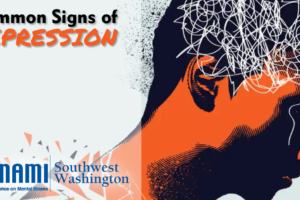By NAMI Southwest Washington
April marks both Alcohol Awareness Month and Stress Awareness Month, offering an important opportunity to explore how these two challenges intersect and impact mental health. Stress and alcohol misuse are often deeply intertwined, forming a cycle that affects individuals and their loved ones. Recognizing this connection is the first step toward healing and recovery.
The Cycle of Stress and Alcohol Misuse
When stress becomes overwhelming, some people turn to alcohol as a way to cope. While it may offer temporary relief, alcohol often exacerbates mental health struggles, leading to increased anxiety, depression, and emotional distress. Over time, what may have started as a coping mechanism can turn into dependence or addiction.
Chronic stress triggers the release of hormones like cortisol, which can lead to physical and emotional exhaustion. In an attempt to numb these feelings, alcohol might seem like a quick solution. However, alcohol disrupts the brain’s natural balance, further intensifying emotional and psychological symptoms.
On the flip side, alcohol misuse can also generate significant stress. It can strain relationships, affect work and finances, and contribute to feelings of shame and isolation. For family members and friends, watching a loved one struggle with alcohol misuse is a heartbreaking and emotionally exhausting experience.
Sarah’s Story: A Journey from Stress to Recovery
Sarah, a 38-year-old mother of two, found herself caught in this cycle. After losing her job during a company downsizing, the weight of financial uncertainty grew unbearable. Sleepless nights, constant worry, and an ever-present sense of failure became her norm. She began to distance herself from friends, avoiding conversations and isolating herself more each day.
“I just needed to shut my mind off,” Sarah recalled. “At first, a glass of wine at night helped me relax. Then it became two, then three. Before I knew it, I was drinking to get through the day. I thought I was in control, but the more I drank, the more out of control I felt.”
Sarah’s relationships began to suffer. Her children noticed her withdrawal, and arguments with her husband became frequent. She missed family events and often woke up feeling irritable and ashamed. Her husband tried to talk to her, but the conversations would quickly turn into fights. The stress she had hoped to escape was only amplified by her alcohol use.
“I remember my daughter looking at me one morning and asking why I was so sad all the time,” Sarah said. “That broke me. I knew something had to change.”
With the encouragement of a close friend, Sarah reached out for help. Through therapy, support groups, and developing healthier coping strategies, she learned how to manage her stress without relying on alcohol. She also worked through the underlying feelings of shame and fear that had fueled her drinking.
Today, she is not only in recovery but also an advocate for mental health awareness. Sarah speaks openly about her experiences, encouraging others to seek help and reminding them that it’s never too late to start the journey toward healing.
The Impact on Families and Friends
Alcohol misuse doesn’t only affect the person drinking; it touches everyone around them. Family members often experience heightened stress, anxiety, and even symptoms of depression. The uncertainty of how to help a loved one struggling with alcohol can lead to feelings of helplessness and frustration.
Parents may feel guilt and worry, questioning what they could have done differently. Partners might experience resentment, loneliness, or emotional exhaustion as they try to support their loved one. Children often face confusion and fear, struggling to understand the changes they see in their parent or sibling. The ripple effect can extend to friends, coworkers, and entire communities.
However, support and open conversations can be transformative. Encouraging a loved one to seek professional help, attending family therapy, or joining a support group like Al-Anon can provide valuable resources and emotional support. Additionally, individual counseling for family members can help them process their own emotions and develop healthy coping mechanisms.
It’s important to remember that recovery is not a solitary journey. Healing is possible for both the individual struggling with alcohol misuse and the people who love them. Rebuilding trust, establishing boundaries, and fostering honest communication are all essential steps toward restoring well-being for everyone involved.
Breaking the Cycle: Seeking Support
If you or someone you love is struggling with stress or alcohol misuse, it’s important to remember that help is available. Recovery is possible, and mental health support can make a world of difference.
Here are some steps to consider:
- Acknowledge the problem: Recognizing the connection between stress and alcohol use is the first step. Take an honest look at how alcohol may be impacting your mental health, relationships, and daily life. Self-reflection and acceptance are crucial to beginning the journey toward healing.
- Reach out for help: Therapy, counseling, and support groups can offer guidance and understanding. Licensed therapists can help you explore underlying issues, identify triggers, and develop healthy coping mechanisms. Support groups like Alcoholics Anonymous (AA) or SMART Recovery provide community and understanding from others with similar experiences.
- Practice self-care: Prioritize activities that promote mental well-being, such as exercise, meditation, and journaling. Engage in hobbies that bring joy and relaxation, and be intentional about getting enough rest. Practicing mindfulness can help reduce stress and increase resilience.
- Strengthen support networks: Lean on friends, family, or community resources for encouragement and connection. Having trusted people to talk to can provide emotional support and accountability. It’s okay to ask for help, and building a support network can make a significant difference in the recovery process.
You Are Not Alone
Taking the step to ask for help is a sign of strength. Whether you are dealing with stress, alcohol misuse, or both, support is within reach. Organizations like NAMI Southwest Washington provide resources, education, and a compassionate community ready to walk alongside you on your journey to healing.
If you need immediate support, call or text 988 to speak with a trained mental health counselor.
This April, let’s break the stigma, foster understanding, and support one another. Healing is possible, and it starts with a conversation.




